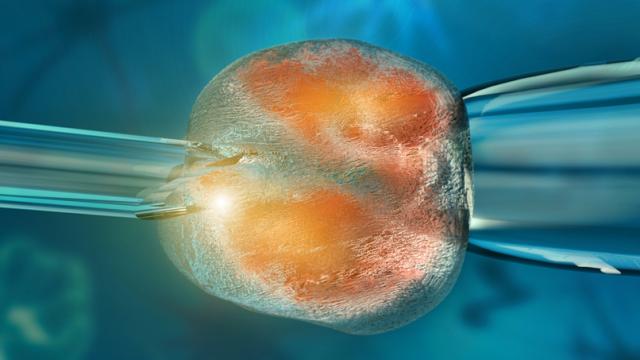Ever since Dolly the sheep was cloned eighteen years ago, scientists have been trying and failing to use that same technique to create cloned human embryos from adult cells. Now, they have finally succeeded, in what could a major step toward personalised organ transplants and other therapies that rely on a pool of stem cells.
Last year, a different team of scientists reported a breakthrough in creating the first cloned human embryos ever. That team used cells taken from a foetus and an eight-month-old infant. This new result, published in the journal Cell Stem Cell, tweaks the procedure to make it also work with skin cells from two adult men, ages 35 and 75.
Confirming that human clone embryos can indeed be made with adult cells means we could potentially someday scrape off a bit of your skin, put it in a cloned embryo, and extract stem cells personalised with your DNA. Those stem cells can then theoretically be programmed grow into any type of tissue — including an organ for transplant.
The basic process is the same as the one used to clone Dolly. The nucleus, which contains DNA, is sucked out of the adult cell and carefully placed in a donor egg, whose own nucleus has been removed. Scientists have gotten this process to work in over 20 different species, but humans, until recently, have proven tricky.
This result does not mean that cloned babies will be born anytime soon, however. The resulting embryo was missing some types of cells and would not have been able to implant in the womb. The difficulty of getting embryos to grow in the womb is, in fact, why partly scientists still haven’t been able to clone monkeys.
The most promising use of this human cloning technique is in creating embryos as a source of personalised stem cells. Currently, we get stem cells from embryos leftover from in vitro fertilization (IVF) — or we reprogram them from adult cells. Both techniques have their drawbacks, however, as IVF stem cells do not perfectly match the patient’s, and the reprogramming may not ever be entirely complete in adult cells, according to some studies.
Any therapies that may result from cloning adult cells is still far, far off on the horizon. Even with this basic lab research, plenty of questions about the moral implications of human cloning remain. It’s been 18 years since Dolly — but the ethical dilemmas haven’t changed a bit. [Cell Stem Cell via Wall Street Journal, TIME]
Top image: Artist rendering of the nuclear transfer technique for cloning. Giovanni Cancemi/Shutterstock
